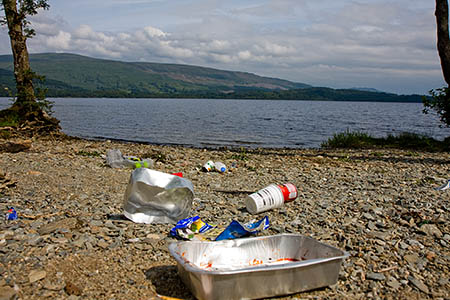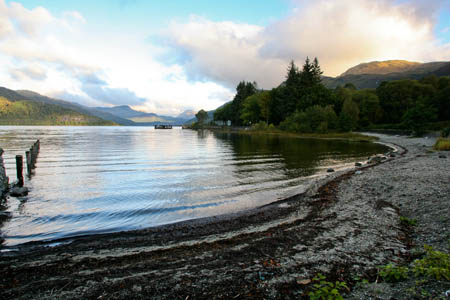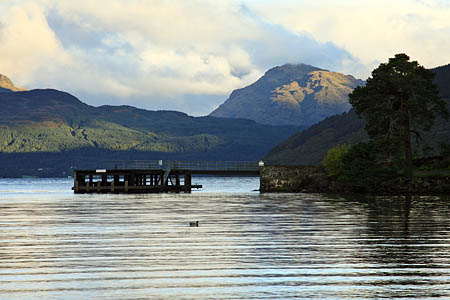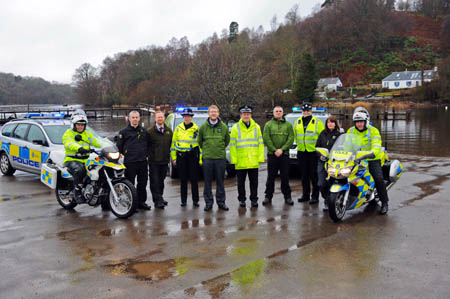A national park authority is to open consultations on plans that would restrict wild camping in many areas along the shores of lochs.
Loch Lomond and the Trossachs authority plans to extend the ban which currently exists on the east shore of Loch Lomond to most of the opposite shoreline, and many other lochs in the park.
The authority said the measures are necessary to protect the environment from damage and nuisance caused by anti-social camping and points to an 81 per cent drop in anti-social behaviour along the eastern side of Loch Lomond since it introduced a ban on camping outside of designated areas in 2011.
But the 2011 bylaw was controversial because it covered a 17km (10-mile) stretch of the West Highland Way, Scotland’s most popular long-distance trail, preventing walkers and mountain bikers setting up camp other than on commercial sites.
The new proposals would extend that area in the Drymen area and also into Glen Falloch, along with banning camping on the east shore of the loch.
A national park spokesperson said: “A growing body of evidence shows that the natural beauty and rural economy of the park is being severely damaged by over-use of the area’s most popular lochshores by high volumes of visitors and anti-social camping.
“Following discussions with local communities and businesses in the worst affected areas, the park authority is proposing solutions to tackle serious problems ranging from litter and fire damage to abandonment of entire campsites and summer-long caravan encampments in laybys.
“East Loch Lomond is an area that was previously blighted by these entrenched behaviours. Three years ago the authority and its partners introduced wide-ranging measures including successful, new camping facilities and bylaws to manage camping pressures.
“This combination has transformed the area, resulting in an 81 per cent reduction in anti-social behaviour with the local economy significantly benefitting.”
The authority is seeking companies, individuals and charities who might offer camping sites in the extended areas, and called its plans ‘unashamedly ambitious’.
Fiona Logan, chief executive of Loch Lomond and the Trossachs National Park Authority, said: “The national park is within an hour’s drive of more than 50 per cent of Scotland’s population and this gives us specific problems which, despite our best efforts, have been escalating.
“The package of measures we are proposing has been developed in conjunction with partners and local communities and reflects our wholesale commitment to dramatically improving the experience of the park for both residents and visitors, whether they camp overnight, or come for the day to walk, swim, kayak, or simply enjoy a picnic.
“Our proposals include significant investment in camping facilities and new bylaws to support more sustainable amounts of camping and to tackle the damage caused by antisocial camping.”
The authority’s board has approved the consultation on proposals to introduce a package of measures in two new ‘management zones’: west Loch Lomond and the wider Trossachs area as well as enlarging the east Loch Lomond zone.
It said the proposed zones, including the existing east Lomond area, amount to less than five per cent of the national park, equating to just less than 70 sq km (27 sq miles).
A new bylaw would also be introduced making it an offence to cause damage to the natural environment and there would be regulations to manage how laybys are used.
Fiona Logan said: “We are excited at the potential for these proposals to bring local communities, businesses and partners together to transform these problem areas into the world class destinations we know they can be.”
Unlike English and Welsh national parks, the two north of the border have an additional aim of promoting sustainable economic and social development of the area’s communities.
The authority said it plans a projected £10m of public-private sector investment in camping facilities over the next five years.
The Land Reform (Scotland) Act allows responsible outdoor activities, including wild camping on mountains, moorland, woods and forests, grassland, margins of fields in which crops are growing, paths and tracks, rivers and lochs, the coast and most parks and open spaces.
The national park authority’s planned bylaws would ban wild camping on an area of the western shore of Loch Lomond from just south of Luss to beyond Ardlui and into the eastern end of Glen Falloch. It would also include part of the shores of Loch Long.
A further area north of Rowardennan, as far as the Ptarmigan Lodge, will be added.
In September 2011, Grant Moir, director of conservation and visitor experience, Loch Lomond and The Trossachs national park, said: “There are currently no plans to extend camping bylaws which have been piloted since June 2011 along the east side of Loch Lomond to other parts of Loch Lomond and the Trossachs National Park.
Gordon Watson, director of operations for Loch Lomond and the Trossachs National Park Authority said the problems were caused by people who were not acting responsibly under the right to roam law.
“Firstly, we are dealing with people acting outwith their rights,” he said. “The problem is people going outwith those rights. Wild camping in its true sense is not what is happening in these areas.
He pointed out the authority has the ability to pass bylaws separately from the act.
“We are proposing this under the National Parks Act; we are not pursuing it within the Land Reform Act.
“This proposal is about how we provide more camping facilities.
“We are looking at very basic, informal camp sites; we are looking at £5-a-night charges. We are keeping this as low as possible.
“We have talked to 21 user groups, including Scottish Environment Link and Ramblers Scotland.
“I would say that the prime thing we are trying to do is preserve the environment.”
Mr Watson said he believed the plans would increase visitors’ ability to enjoy access to the outdoors. “There are no-go areas which people want to visit but are put off.
“We have 9,000 hours of ranger time and we are also paying for 800 patrol hours with the police along with their normal 6,500 hours in these areas. We can’t put in any more resources.”
The operations chief said the areas proposed, including most lochside locations within the national park, were where anti-social behaviour had been observed.
“It is where we have collected evidence over years. It covers the hotspots.”
But Helen Todd, campaigns manager for Ramblers Scotland told the BBC when plans were first unveiled, that there was a worry the trend would spread and access rights eroded.
She said: “I’ve talked to the park authority and we share the same desires for how to manage these places and I have a lot support for the work they’re doing, but I really don’t buy the case that they need bylaws to bring these into effect.
“In terms of setting precedents, we’ve seen it spreading across the park, and I’d imagine there are communities in other parts of Scotland where people will be thinking they need them too.
“Bit by bit this fantastic access legislation we have is being whittled away.”
Dave Morris, recently retired director of Ramblers Scotland, said: “They introduced the camping bylaws at the same time as introducing the alcohol prohibition. Now, the situation is much better but we don’t know whether it’s due to alcohol, which was obviously a major issue.
“It’s a fundamental part of the Land Reform Act, and a fundamental part of our tradition, to be able to camp in areas like Loch Lomond and other areas of Scotland without hindrance.”
The consultation opens on Monday, 13 October. The proposals can be seen on the Your Park website. Deadline for submissions is 12 January next year.




Jonathan Hammond
06 October 2014Last year my wife and I camped on the shores of Loch Earn late one evening on the way up to Glencoe.
When we woke in the evening, aside from the fantastic view of the mountains, our breath was taken away by the huge about of disgusting rubbish on the shores of the Loch.
Some of it strewn about, some of it in black plastic liners and the left... I really couldn't understand the mentality of the people who'd done it.
We ran into some locals as we packed the tent away. They told us that it was so-called "fishermen" responsible for the mess. They spend all night getting drunk, lighting fires, and leaving behind a landscape of empty beer cans and discarded barbeque grills.
Whoever it was, it broke my heart to see it.
Jonathan Hammond
06 October 2014* "When we work in the morning"
Wish I could edit my comment :)
Stravaiger
06 October 2014Access rights are not being eroded by extending bylaws - we have a right of responsible access, not a right to behave irresponsibly, destructively or aggressively. In heavily used areas, even if all the campers are trying to behave responsibly, the hygiene issues are immediately obvious - nobody wants to pitch their tent on top of faeces, or crawl out in the morning and put their hand in it. (For this reason many Duke of Edinburgh Award groups are reluctantly switching to using camp sites rather than some of the wild camping sites that they have used for years, and which are now just being used by too many groups.) Providing basic campsite facilities is the only responsible answer in spots where large numbers of people want to camp close to their cars. Responsible wild camping in remoter spots is still legal, and probably a lot less scary than "wild" roadside camping in the midst of a gang of aggressive drunks.
Rod Freeman
06 October 2014There are always arseholes. These garbage dropping types will also likely be the ones who would be noisy and destructive. Charge everyone one a fee to use the area, if they leave the area unclean, a lifetime ban for them. Use the income for upgrades in the area for facilities.
Ian
07 October 2014Someone suggested that a distinction should be made between 'wild camping' (miles from a road) and camping that's within a short stroll from your car.
As to the DofE - I've seen some fairly large DofE groups (multiple groups of seven) camping in remote areas, which will also create hygiene issues, despite burying it, as those sites are used regularly.
If an activity is popularised, with increasing numbers taking part, then there will be consequences to deal with.
Chris
07 October 2014A ban on litter is sufficient. This control freakery smacks of a police state.
Mike
07 October 2014Don't agree Chris. Its not a police state to prevent people causing damage and disturbance and blighting other visitors and residents lives. I think you will find there is a litter ban in place already, as indeed there is in all public places in the entire kingdom. Doesn't do much good does it? Sadly we have too many people who enjoy causing a mess and a disturbance and care nothing for anybody else, or for their surroundings. This is the law of unintended consequences. When the Scots adopted a more generous version of access legislation than the English, little did they know they monster they were unleashing. I cant bleive that this was what envisaged. Time to put boundaries on access I am afraid, and send these louts packing. I think the Ramblers have got this one wrong, by-laws are needed. I tell you what, I was thinking of doing the West Highland Way next year. This has put me right off!
RJ Webb
07 October 2014A monster? -Folk have camped by Loch Lomond long before the 2003 access legislation. We are suffering from fashion and the easy availability of cheap disposable camping gear. This kind of camping has never, ever been legal and has always been trespass. We have the right of responsible access. Endless fire rings, permanent encampments and cutting live trees is not responsible access and the krapkampers have no more right under the law here than any campers in benighted England. Is it acceptable under responsible access to light a fire? That is not a right of access. Enforce the current law - everywhere.
The only monster is the appalling lack of freedom and the control freakery you encounter in England and Wales. Please keep it. (or better still get rid)
Jon
12 October 2014Mike, the Land Reform Act doesn't provide a right to camp just anywhere. It provides for responsible wild camping - away from roads and habitations - and comes with guidelines which spell out quite clearly what "responsible" means. None of the camping which has caused concern by Loch Lomond is permitted under the Land Reform Act. The boundaries are already in place.
By-laws seem to be taken more seriously by people; it may be that they are desirable in some locations, but my fear is that they will be introduced too widely. I have no problem with by-laws, and policing, which apply to easily accessed locations near to roads, and deal with irresponsible behaviour such as vandalism, littering, noise, and significant environmental damage. Locations far from roads are rarely visited in the sort of numbers that result in levels of damage that require heavy-handed control measures. Long may that continue to be the case - and let's continue to encourage responsible, low-impact behaviour from walkers, cyclists, canoeists and climbers.
Mike
13 October 2014I agree with you Jon. Clearly the existing laws are not working though in that area. Because people are either unaware, don't care or seem unable to follow the current law on wild camping. A specific ban on camping in some areas such as Loch Lomond shore seems to be the only solution doesn't it? As you say, a law prohibiting something in a specific area with some enforcement will put off all but the most determined miscreant. Who wants a criminal record for camping? Sadly it looks like those of us who pitch our tent, spent some quiet time looking at the scenery and be gone after breakfast not leaving a trace, will not be able to do so by Loch Lomond
As an aside. I was in Sweden last year wild camping along some of the Kings Trail and nobody there would dream of acting like those people at Loch Lomond do. Mostly we were in isolated places and camped wherever we chose - We didnt see a tarmac road for 5 days. On the final day we crossed through a nature reserve area where camping is restricted to designated zones - we came across one of these areas. This was about 3-4 miles from the road. It had a lean-to shelter with benches, so one could cook out of the rain, an earth closet and a stone built campfire/firepit with stone stools installed in a circle around it if you wanted an open fire. And you pitched your tent wherever you wanted in a radius of about half a mile in the woods. It was in pristeine condition, no rubbish, no grafitti, no damage. In the UK it would have trashed within a week!
edward jefferson
20 January 2016It would be helpful to have the information as to where these policies are officially written down, in order to carry a copy in those states with this policy, a park attendant late in the day may not just take our words for it.